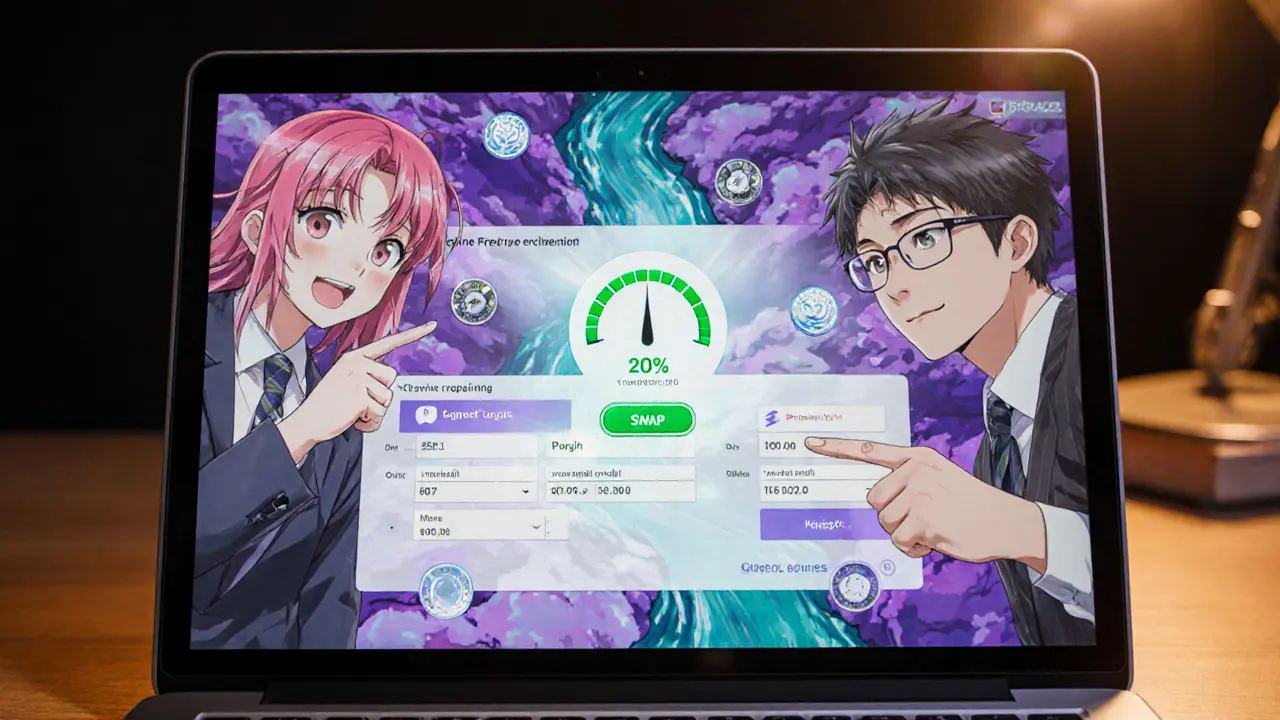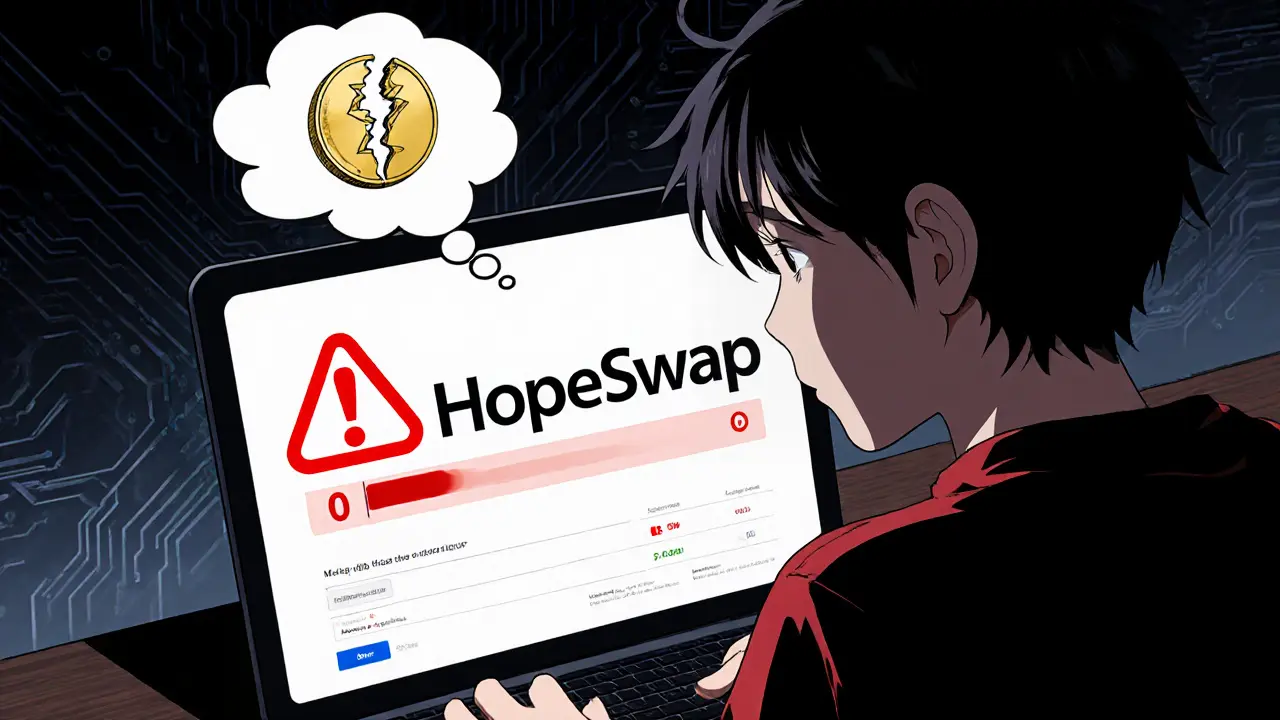RadioShack DeFi Review: Reality Check on the Moonriver Crypto Exchange Claim

Moonriver DEX Verification Tool
Verify a Moonriver DEX
Check if a DeFi platform actually operates on Moonriver and meets key legitimacy criteria from the RadioShack DeFi review.
Quick Takeaways
- RadioShack DeFi does not run on Moonriver and has no verifiable trading volume.
- The only Moonriver‑based DEX with public activity is FreeRiver.
- RadioShack DeFi’s enterprise pitch lacks technical documentation, GitHub repos, or community channels.
- Moonriver’s niche ecosystem offers Ethereum compatibility but suffers from low liquidity and declining project count.
- For anyone looking to trade MOVR or other Moonriver assets, FreeRiver or larger EVM‑compatible DEXes like Pangolin remain the practical choices.
When scanning the DeFi landscape, RadioShack DeFi is described as an enterprise‑focused decentralized finance platform that claims to bridge corporate leaders with crypto markets. The name sparks curiosity because it pairs the legacy retail brand “RadioShack” with the buzzword “DeFi,” and the subtitle “(Moonriver) crypto exchange” suggests a dedicated DEX on the Moonriver parachain. In reality, the picture is far messier. This review untangles the hype, checks the technical facts, and compares RadioShack DeFi with the only Moonriver DEX that actually exists - FreeRiver.
What Is Moonriver and Why Does It Matter?
Moonriver is a community‑driven parachain on the Kusama network, launched on 18June2021 as a “canary” version of Moonbeam. It uses a Nominated Proof‑of‑Stake (NPoS) consensus, delivering finality in 12‑15seconds and offering full Ethereum Virtual Machine (EVM) compatibility. Developers can port Solidity contracts with minimal changes, making Moonriver an attractive testbed for Ethereum‑centric projects seeking Polkadot’s security.
Key stats (June2024): MOVR price $7.00, market cap $67.9M, 24‑hour volume $6.3M, total supply 11.9M. By Q32025, Moonriver‑based DEXs held roughly 1.2% of total DEX market share, according to TokenTerminal.
RadioShack DeFi - The Platform Claims
According to a Slashdot enterprise‑DEX listing (Oct2025), RadioShack DeFi “aims to serve as the link between the corporate leaders driving the world’s businesses and the emerging realm of cryptocurrencies.” The pitch emphasizes:
- Enterprise‑grade compliance and KYC/AML layers.
- Access to crypto liquidity for corporates.
- Brand leverage from the historic RadioShack name.
Noticeably missing are concrete technical details: no whitepaper mentions the underlying blockchain, no GitHub repo, and no public API documentation. The official website returned a 404 error in mid‑October2025, and Trustpilot or Reddit contain zero verified user reviews.
FreeRiver - The Real Moonriver DEX
FreeRiver is a decentralized exchange built directly on Moonriver, offering token swaps, liquidity pools, and yield farming. It uses React for the front‑end and Substrate for blockchain integration. The latest GitHub commit (April2025) added multi‑chain portfolio tracking, but overall development activity has slowed.
Community feedback is modest: 23 SourceForge reviews averaging 3.2/5 stars, with frequent complaints about low liquidity (14 mentions) and a steep learning curve (9 mentions). A Reddit user noted 8% slippage on swaps exceeding $500, prompting many to fallback to Pangolin.

Head‑to‑Head: RadioShack DeFi vs. FreeRiver
| Attribute | RadioShack DeFi | FreeRiver |
|---|---|---|
| Underlying blockchain | Undisclosed (no evidence of Moonriver) | Moonriver (MOVR) |
| Target user base | Enterprise & corporate finance teams | General DeFi traders & liquidity providers |
| Liquidity depth (average daily) | Not reported | ≈$1.2M (as of Q32025) |
| Development activity | None visible; website dead, no repo | Last major release Apr2025, minimal commits thereafter |
| User adoption | Zero verified users; no DappRadar listing | ~1,800 unique wallets (DappRadar, Q32025) |
| Security audits | Not publicly disclosed | One community audit (2024) - no critical issues |
Why the Confusion Exists
Search engines and comparison sites often list RadioShack DeFi side‑by‑side with FreeRiver because both contain the word “DeFi” and the former mentions Moonriver in marketing blurbs. However, the lack of concrete technical data means the association is speculative at best. The brand’s nostalgic cachet draws attention, but without a deployed smart‑contract suite on Moonriver, the claim remains unsubstantiated.
Analysts at Delphi Digital (Oct2025) warn that legacy brands entering crypto without clear product‑market fit face “near‑impossible hurdles.” RadioShack’s historical bankruptcy further erodes trust, especially when the platform cannot prove on‑chain activity.
Implications for Traders and Enterprises
If you are a corporate treasury looking for a “crypto gateway,” the red flags are plenty:
- No transparent smart‑contract address to audit.
- Zero liquidity - you can’t trade what isn’t there.
- Absent community - no support channel for issues.
For regular traders interested in Moonriver tokens, FreeRiver, despite its liquidity constraints, remains the only native DEX. Larger EVM‑compatible platforms (e.g., Uniswap on Ethereum, PancakeSwap on BSC) still offer deeper pools and lower slippage for MOVR via bridge solutions.

Future Outlook for Moonriver and Its DEXs
Moonriver’s roadmap (Jan2025) focuses on cross‑chain interoperability and reduced gas fees. Version9.6.0 (Aug2025) boosted throughput by 22%. Yet, Mesari’s 2025 Polkadot report highlights the “experimental nature” of Kusama as a deterrent for enterprise adoption. The ecosystem’s project count fell from 112 (Q12025) to 87 (Q32025), reflecting waning developer enthusiasm.
If Moonriver consolidates with Moonbeam by 2028, as predicted by Messari, smaller DEXs like FreeRiver may either migrate or be forced to shut down. RadioShack DeFi, already dormant, would likely disappear without any migration path.
How to Verify a DeFi Platform’s Legitimacy
- Check the contract address on a block explorer (e.g., Subscan for Moonriver).
- Look for an open‑source repository; audited code should be publicly available.
- Confirm liquidity on DappRadar or DeFi Llama - zero figures are a red flag.
- Search for community channels (Discord, Telegram) and gauge activity levels.
- Read independent reviews; avoid platforms mentioned only on their own website.
Applying this checklist to RadioShack DeFi fails on every point.
Final Verdict
RadioShack DeFi, despite an eye‑catching name, offers no verifiable on‑chain presence, no Moonriver integration, and no user base. FreeRiver, while modest, is the genuine Moonriver DEX and the only viable option for on‑chain MOVR swaps. For anyone seeking a crypto exchange on Moonriver, focus on FreeRiver or bridge assets to larger, more liquid ecosystems.
Frequently Asked Questions
Is RadioShack DeFi a real exchange on Moonriver?
No. There is no public contract address, GitHub repo, or liquidity data confirming that RadioShack DeFi operates on Moonriver.
What Moonriver DEX can I actually use?
FreeRiver is the only native Moonriver DEX with a working front‑end and on‑chain liquidity. For deeper pools, consider using a bridge to Ethereum‑based DEXes.
Why does RadioShack’s brand matter in crypto?
The legacy brand creates curiosity, but without solid technical infrastructure it adds little credibility. Trust in crypto derives from code transparency, not brand nostalgia.
How can I check if a DeFi project is live on Moonriver?
Search the contract address on Subscan, verify liquidity on DappRadar, and review the project’s GitHub activity. Active community channels are also a good sign.
Should enterprises use RadioShack DeFi for crypto exposure?
Given the lack of verifiable infrastructure, it is not advisable. Corporates should opt for established, audited platforms with clear compliance procedures.



Jordan Collins
August 5, 2025 AT 04:00When you examine the DeFi landscape, clear signals emerge that separate genuine protocols from hype‑driven projects. The lack of a contract address and public repo for RadioShack DeFi is a fundamental omission that any prudent analyst would flag. In contrast, FreeRiver’s on‑chain activity can be audited directly on Subscan, providing transparency for users. For anyone considering an enterprise gateway, the due‑diligence checklist outlined in the post should be applied without exception.
Andrew Mc Adam
August 6, 2025 AT 05:13Stepping onto the moon‑lit stage of Moonriver, one quickly realizes that not every name shines with substance.
RadioShack DeFi, despite its nostalgic banner, appears more like a phantom that vanished before the curtain even rose.
The missing whitepaper, dead website, and absence of a verified contract address are red flags that scream louder than any marketing slogan.
Meanwhile, FreeRiver, though modest in liquidity, offers a tangible interface, a GitHub history, and a community that actually trades.
Developers can point to the April 2025 commit that introduced multi‑chain portfolio tracking – a concrete upgrade, not a promise.
Liquidity may be thin, but the fact that ~1,800 wallets have interacted proves there is at least some adoption.
For corporate treasuries, betting on a brand without on‑chain proof is akin to buying a relic that never existed.
In the fast‑moving DeFi world, transparency outweighs nostalgia every single time.
Even the most passionate fans can’t overlook that a dead website in October 2025 leaves a gaping hole in credibility.
Think of it as a lighthouse that never turned on its lamp; you can see the structure, but you can’t navigate by it.
FreeRiver’s community, though small, provides the necessary signals to assess risk, whereas RadioShack offers none.
So if you’re hunting for a trustworthy gateway, the path leads straight to platforms with verifiable code and active users.
Shrey Mishra
August 7, 2025 AT 09:00From a technical standpoint, the absence of an audit report for RadioShack DeFi is unsettling. Without a contract address, any claim of compliance remains speculative at best. FreeRiver, while limited, at least presents an auditable code base for scrutiny.
Ken Lumberg
August 8, 2025 AT 12:46It is ethically irresponsible for any entity to leverage a legacy brand to mask a lack of substance. Enterprises deserve more than nostalgic branding; they require concrete security guarantees. The crypto community must call out such superficial attempts before investors are misled.
Blue Delight Consultant
August 9, 2025 AT 16:33One might contemplate that the allure of a name like RadioShack taps into collective memory, yet philosophy reminds us that memory alone does not constitute trust. In the realm of finance, trust is forged through transparent mechanisms, not nostalgic sentiment. Therefore, rigorous verification remains the cornerstone of any prudent engagement.
Wayne Sternberger
August 10, 2025 AT 20:20For teams seeking a DeFi bridge, start with the checklist: verify contract address, audit status, liquidity depth, and community activity. FreeRiver checks most of these boxes, albeit modestly, whereas RadioShack falls short on all fronts. Prioritizing platforms with open‑source repositories will also streamline compliance reviews.
Gautam Negi
August 12, 2025 AT 00:06Contrary to popular belief, low liquidity does not automatically render a DEX unusable; niche markets can still thrive with focused strategies. Some corporates prefer a controlled environment over deep pools, finding value in bespoke liquidity solutions. Thus, dismissing RadioShack solely for its current opacity might overlook future proprietary developments.
Shauna Maher
August 13, 2025 AT 03:53RadioShack DeFi is just a sham built to scam unsuspecting investors.
Kyla MacLaren
August 14, 2025 AT 07:40I get the frustration, but it’s always good to double‑check sources before labeling anything outright; sometimes projects are just in early stages.
Michael Grima
August 15, 2025 AT 11:26Wow what a spectacular display of hype over substance the crypto world keeps serving up. You see a brand name like RadioShack and your brain lights up like a fireworks show. Then you dig a little deeper and find nothing but a ghost town of code. No repo no contract no liquidity just a squeaky‑clean marketing brochure. It’s almost tragic how easily some people can be swayed by nostalgia. The DeFi space should be about code not nostalgia. FreeRiver, on the other hand, may not be a juggernaut but at least it shows up on Subscan and has a few real users. That tiny community is still better than a phantom platform. Corporate treasuries deserve better than a fancy logo with no substance. The audit silence from RadioShack is louder than any promise they make. Liquidity zero means you can’t trade, period. It’s like opening a bank vault that’s empty and expecting gold. Investors need to ask for proof, not just pretty pictures. The checklist in the article is spot on and should be mandatory. If you can’t provide a contract address, step off the stage. In the end transparency wins, drama loses.
Maria Rita
August 16, 2025 AT 15:13Your point hits the nail on the head; transparency really does separate the wheat from the chaff in crypto.